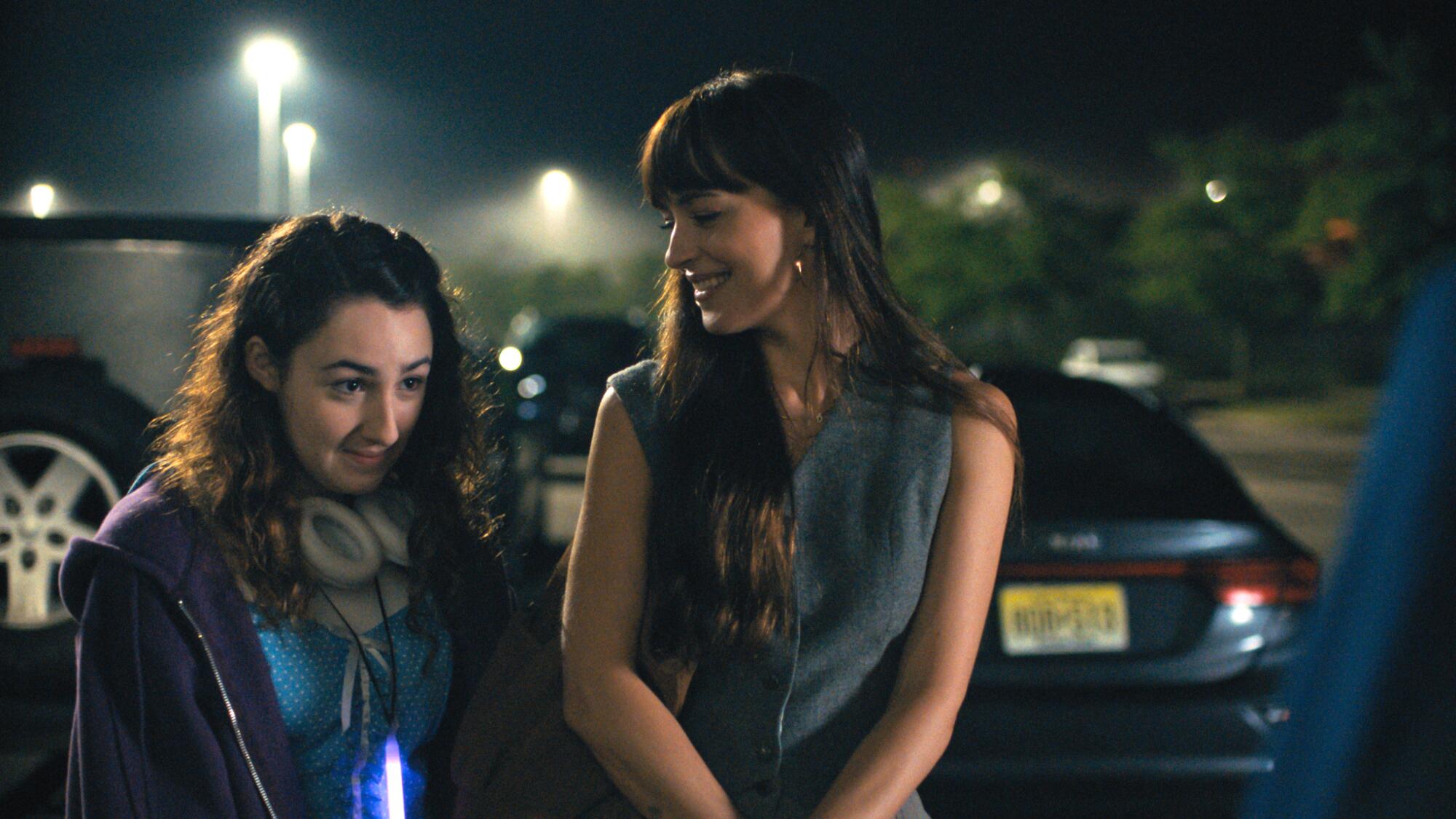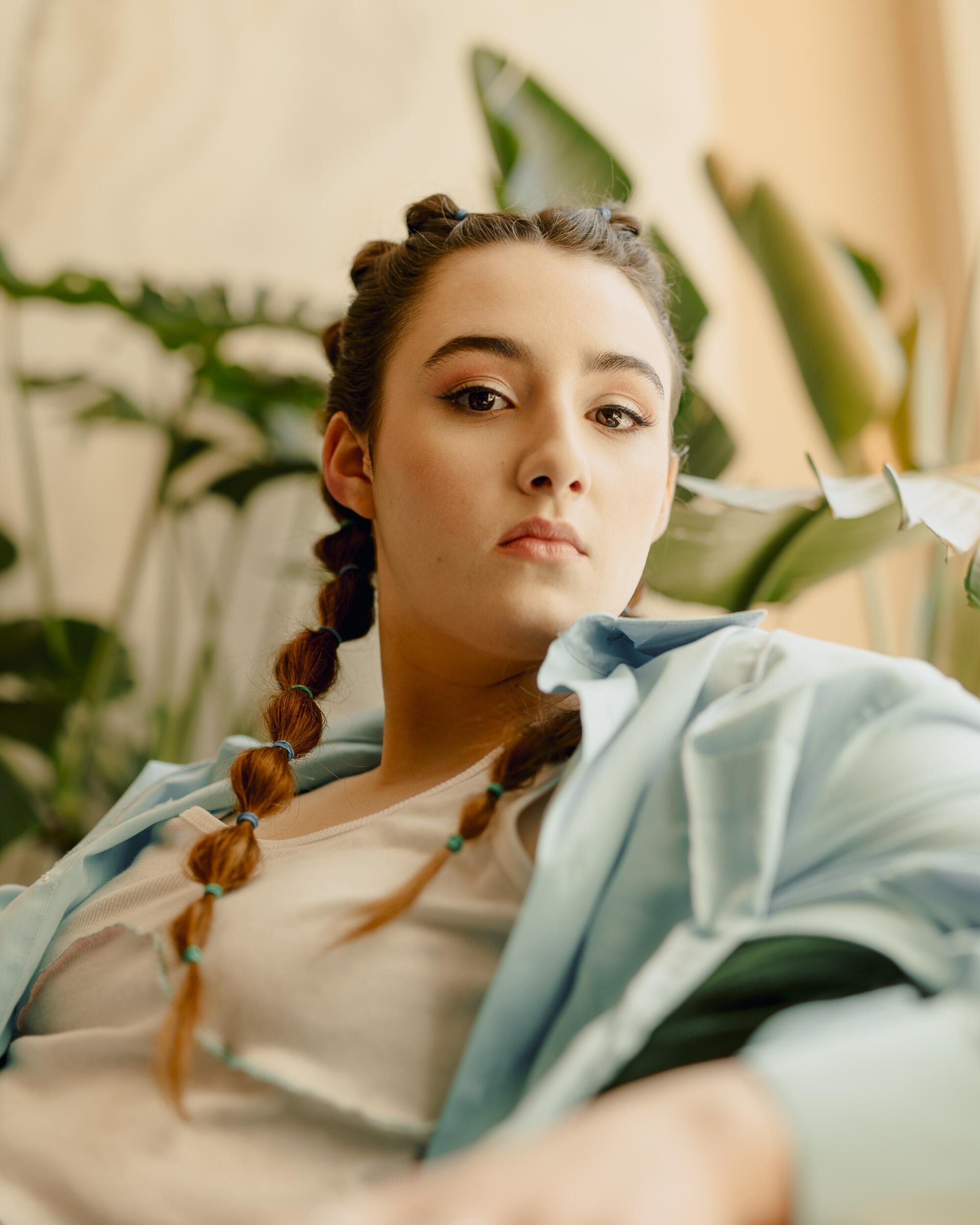- Share via

The arrival of the film “Cha Cha Real Smooth” announces not just one but two noteworthy new talents.
Writer, director, producer and actor Cooper Raiff at age 25 has already made two award-winning feature films. His first, “S—house,” won the grand jury award at the 2020 South by Southwest Film Festival even as its premiere was canceled by the onset of the pandemic. “Cha Cha Real Smooth” won the audience award at the 2022 Sundance Film Festival, while Raiff again saw the in-person premiere curtailed due to a surge in COVID-19 cases.
It wasn’t until “Cha Cha” played at the 2022 South by Southwest festival that Raiff finally got to see one of his films with a public audience.
“I just realized that this is the reason why I wanted to make movies and what it’s really all about,” Raiff said of finally sharing one of his films with a proper audience.
“After South By, I had a whole week where I was like, ‘Slow down.’ I’m not just making things. I’m making and showing things and communicating things, and that takes other people,” said Raiff. “I like the idea of just showing it to my girlfriend or my mom, but there’s kind of nothing more freeing than seeing it with so many different kinds of people who are strangers, and I realize it’s what it’s all about.”
Though the film stars Raiff alongside Dakota Johnson, also a producer via her TeaTime Pictures banner, and features supporting turns from Leslie Mann and Brad Garrett, it is young Vanessa Burghardt who steals nearly every scene she is in with her sly, charismatic presence.
In the film, Raiff plays Andrew, a new college graduate who isn’t sure what to do with his life. He is back living with his mother (Mann) and her new husband (Garrett) and happens into a job as a party starter for local bat and bar mitzvahs. Which is how he meets Domino (Johnson), whose daughter, Lola (Burghardt), has autism and struggles to fit in with other kids. Andrew finds himself increasingly entangled in Domino and Lola’s lives as he falls for Domino.

Burghardt, now 18, makes her screen debut with the role. Like the character of Lola, Burghardt also has autism. Though “Cha Cha Real Smooth” is her first role in a movie, she has been auditioning for parts for a number of years.
She recalled what initially drew her to acting.
“When I was younger, I didn’t do a lot of socializing and I didn’t really relate to any kids,” said Burghardt. “So I watched a lot of movies, and then as I got older it kind of became the way I learned social cues and sort of how I understood myself and other people. And then I think when I was 9 or 10, I saw the gag reel for ‘The Avengers,’ and they all looked like they liked each other and they were a part of something. I’d never been a part of something, and I wanted to be a part of something.”
Raiff was immediately stuck by Burghardt’s audition tape. He could tell she was reading the scene with her mother off-camera, and the connection he felt between them was exactly the kind he was trying to capture in the characters of Lola and Domino.
“That’s why I wanted to make this movie, the whole engine for the movie is that thing. One of the best things that life has to offer is a bond like that,” he said. “I felt it so immediately when I watched her audition tape, and she’s also really majorly talented. She did the scene perfectly, and it got me excited about all the possibilities. She had so much more going on than what was on the page.”
Through a series of Zoom conversations, ostensibly rehearsals, Raiff began to tailor the role of Lola to Burghardt, aging the character up just a bit and making her more reflective of Burghardt’s experiences and personality. During the development process, Raiff and the production also consulted with RespectAbility, a nonprofit organization that advocates for people with disabilities.
“I don’t think we ever said, ‘So, Vanessa, tell me about all the times you’ve been bullied before. I’m taking notes,’” Raiff said. “But I think I did have instincts that helped shape the character after she was signed on to do it.”
The care that Raiff put into constructing the role and the depiction of autism in the story, as well as how she was considered and consulted during production, was meaningful to Burghardt.
“I don’t know how to describe it. I mean, yes, obviously it’s meaningful to me, but it’s not because she’s autistic,” said Burghardt. “It’s because I got to play a person that has feelings and I never felt like I was being used for anything. I felt like I actually mattered and was an integral part of the story.”

However much Raiff may have altered the role to fit Burghardt, it is important to her that audiences recognize the extent to which she is indeed acting and the character of Lola on screen is the result of a performance.
“I think sometimes people think, ‘Oh, they just let this autistic girl on screen, and look how adorable that is.’ But I’m doing a job just like anyone else,” she said. “I am acting and I did have to put in the work, and it’s not like they just let me up there and it’s very cute. I’m the same in the sense that I had to prepare and think about it as well.”
Raiff initially created the characters of Domino and Lola as a way to reflect on the dynamic between his mother and his younger sister who was born with holoprosencephaly, a brain condition that has left her unable to walk or speak.
“I was just writing this character that was this mom of a disabled kid, including a scene with her line ‘My life has been defined by her stages and will always be defined by her stages.’ My mom said that to me one time, and when I heard it, I was like, ‘I don’t know what to do with this information other than write it down,’” said Raiff.
“And from there I started writing this character, and I didn’t think I was ready in any way to make a movie starring Domino,” he said. “I think for a while I’ll be telling stories through the lens of the character I know best, which is a young, dumbass boy. So putting that person at the middle and showing things through his lens and really telling the audience things as he’s learning things.”
One thing that sets Raiff apart from many emerging filmmakers is that level of self-awareness and even self-critique included in his work.
“He’s his own critic,” said actor and filmmaker Jay Duplass, who has been a friend and mentor to Raiff ever since Raiff tweeted a link to Duplass of an early film he had posted online and Duplass actually watched and responded to it.
“I’ve noticed that some of the criticisms of his work are that he presents himself as a perfect kid. But I don’t particularly see it that way,” said Duplass. “And he’s extremely hard on himself in real life.”
It was important to Raiff that the story not always depict Andrew and his actions in the most flattering way, in the hope that audiences would find themselves questioning some of what he does.
“I think all movies should interrogate their main character in massive ways,” Raiff said. “I put a lot of pressure on myself to explicitly not write emotional propaganda. Even though I think that’s what movies are, but in order for me to ever say yes to acting in something that I’m also writing and directing, I have to find a self-reflexive way in.

“It’s important to be critical of your main character,” he said. “It’s interesting with ‘Cha Cha’: A lot of people talk about how kind Andrew is and they leave it at that, and I’m like, ‘Yes, but he has no clue who he is. And it’s a problem.’ I’m glad that people watch Andrew and they’re like, ‘What a sweet heart he has,’ but I do hope that people know that’s not where it ends.”
As Raiff has been navigating his way through Hollywood, he’s learned to use his age to his advantage, particularly as he often finds himself the youngest person in the room.
“My age comes up all the time. I don’t think of myself as representing young people in any way, but I constantly feel like I’m talking to older people and saying, ‘Come on. I want this to feel alive,’” said Raiff. “I talk to a lot of producers who are older and I don’t want to say jaded, but they look at me like I’m a talking dog.”
Raiff is even unexpectedly blasé about having been the biggest sale at Sundance; “Cha Cha Real Smooth” sold to Apple TV+ for a reported $15 million. As he points out, relative to cost, the sale of the microbudget “S—house” to IFC Films was actually greater.
Continuing to move at an enviable pace, Raiff is already prepping his next movie, the sports story “The Trashers.” The project stars David Harbour, and Raiff is not planning to be in it as an actor. He described the project as “a really personal, scrappy ‘Moneyball.’”
For her part, Burghardt has continued to audition since shooting “Cha Cha Real Smooth” but hasn’t booked any more roles as of yet.
“Cha Cha” has also come out as the first movie released by Apple TV+ since the steaming service won the Oscar for best picture for “CODA.” The seemingly unflappable Raiff is also not letting that get in his head.
“It’s honestly laughable,” said Raiff. “When that happened, I just knew all of a sudden people were gonna be like, ‘What, is “Cha Cha Real Smooth” gonna win best picture? A movie called “Cha Cha Real Smooth”?’ And I did go to Apple, and I said we should not have the same game plan as ‘CODA.’ It’s not ‘CODA.’ It’s called ‘Cha Cha Real Smooth.’ [But] I was so excited about the fact that we’re their next movie.... [The Oscar win] is so great for Apple, and therefore great for ‘Cha Cha.’”
More to Read
Only good movies
Get the Indie Focus newsletter, Mark Olsen's weekly guide to the world of cinema.
You may occasionally receive promotional content from the Los Angeles Times.











